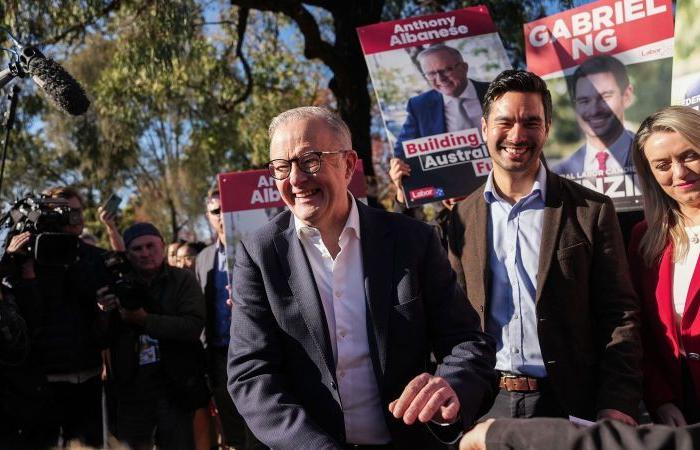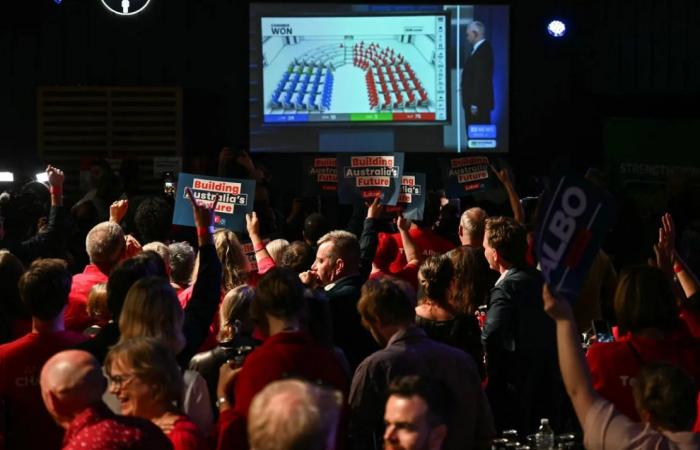CNN —
The Prime minister of Australia, Anthony Albanese, secured a second mandate this Saturday in what seems to be an overwhelming electoral defeat for the leader of the Liberal Party, since the voters opted for the stability about the change in a context of world agitation caused by the return of the president of the United States, Donald Trump, to the White House.
Albanese’s Labor Party seems on the way to get the majority, and while the votes were still counting, the first results showed a strong turn to their center -left match, according to the projections of the National Chain ABC and Sky News, affiliated with CNN.
The leader of the Liberal Party, Peter Dutton, who hoped to end the night as Prime Minister, lost Brisbane’s seat, a suburb of the outskirts, which he has held for more than 20 years, ending a brutal night for the veteran politician who held important positions in the last coalition government.
The Labor Victory makes Albanese the first Australian prime minister to be re -elected in two decades, from John Howard in 2004.
The return of a leftist government to Australia occurs after a similar turn of Canada to the Liberal Party of Mark Carney.
Although Australia did not face the same threats to her sovereignty as Canada, global tariffs and Trump’s policy changes have undermined the confidence of Australians in the United States, according to recent surveys.
Dutton had started the five -week campaign with his right foot. However, analysts claim that their possibilities were seriously harmed by the errors and changes of the course of their policies, and tied by Trump’s demolishing approach to the global order.

Instead, Albanese’s Labor Party showed firmness, adopting a hard tone in response to Trump’s decision to impose 10 % tariffs on Australia, which were subsequently suspended, according to analysts.
After Trump’s announcement on April 2 about the “Day of Liberation”, Albanese summoned a press conference and, accompanied by his Ministers of Foreign Affairs and Commerce, said: “This is not a friendly act.”
In contrast, Dutton was difficult to get rid of comparisons with Trump by his opponents.
during the campaign, the senator named Minister in the Shadow for government efficiency declared that he wanted to “make Australia again be great.”
Jacinta Nampijinpa Price later admitted that he had not realized what he had said. When asked this Saturday if the comparisons with Trump had harmed Dutton, Price replied: “If enough mud is thrown, sticks.”
The ability of candidates to deal with the US president had been a topic of conversation during the campaign. Despite criticism for his inability to talk on the phone with Trump, Albanese said he had had “warm” conversations in the past and did not see reasons to distrust him. Canberra is still a firm Washington ally, despite Trump’s tariff threat.
In the last three years, Albanese is attributed to improve relations with China, which led to the elimination of tariffs imposed during the mandate of its predecessor. His government has also repaired relations with the island nations of the Pacific, partly to prevent Beijing from filling a leadership vacuum. As for foreign relations, he has promised more of the same.
The Albanese government has been widely criticized for not being aggressive enough in its efforts to control the increase in the cost of life, from the purchase invoices to housing prices. During his second term, he promised to relieve the pressure of the cost of life after a long period of high inflation, offer a tax reduction and short -term relief of the increase in energy invoices, and build 1.2 million homes to alleviate the real estate crisis.
Andrea Carson, a professor of political communication at La TroBe University of Melbourne, said that Albanese’s performance has decreased because she has had to govern at a difficult time, “after the Covid-19 pandemic, in times of austerity.”
“An environment of high inflation, which have also experienced other developed economies, limits the ability of a government to implement these large structural reforms,” said Carson.
Albanese took advantage of the campaign to communicate to voters that his country had overcome the crisis and that inflation and interest rates had dropped. It seems to have worked, since the voters supported the proposals of the Labor Party for the increase in the cost of life against the proposals for the opposition.
The defeat of the Liberal Party means that Dutton’s plan to build seven nuclear plants will not advance. On the other hand, Albanese’s next mandate will witness the rapid and continuous deployment of renewable energy projects, which has outraged some rural voters.
Some communities say that industrial energy projects – solar, wind and battery facilities – are destroying forest habitat and the quality of life they enjoyed before. The Government aims to reduce carbon emissions by 43 % by 2030 and to date they say that it has approved enough renewable energy projects to supply 10 million homes.







